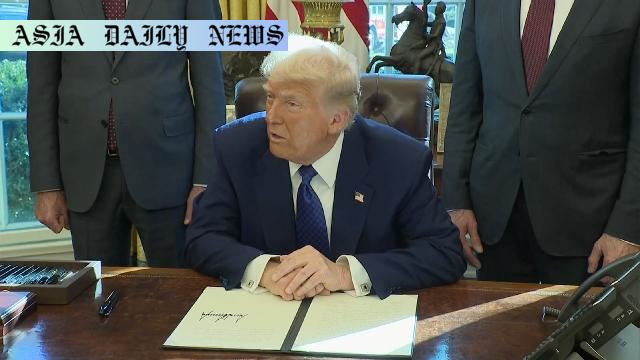Tariffs: President Donald Trump considers imposing automobile import tariffs possibly starting around April 2nd.
President Donald Trump hints at imposing new automobile tariffs by April.
Japan, a major US auto exporter, may suffer severe economic impacts.
Trump signed a reciprocal tariff plan to match tariffs imposed on US exports.

Trump’s New Auto Tariff Plans
On Friday, US President Donald Trump announced his intention to impose tariffs on automobile imports, possibly starting around April 2nd. The announcement, made at the White House, lacked critical details regarding the countries it would affect or specific tariff rates. However, any move to implement tariffs on all countries could significantly impact key trading partners, notably Japan, whose automobile exports to the US are critical to its economy.
Global Implications of Automobile Tariffs
Japan, a prominent exporter of vehicles to the US, stands to face substantial economic disruptions if these tariffs materialize. According to the Japan Automobile Manufacturers Association, Japan exported approximately 1.48 million units to the US in 2023 alone. Tariffs on these imports would pose challenges to automobile companies and potentially alter global export dynamics.
The Argument for Reciprocal Tariffs
Pushing for ‘reciprocal tariffs,’ President Trump has justified his tariff policies by stating that countries imposing high tariffs on US goods should face equivalent barriers. This approach stems from his longstanding perspective that low-priced auto imports are harming the competitiveness of domestic manufacturers. While this might bolster the local auto industry, it could also strain international trade relations.
Economic Risks and Strategic Responses
While Trump believes these measures to be a step toward balancing trade, potential retaliation from countries like Japan remains a critical concern. Countries dependent on US markets for automotive exports may consider countermeasures to mitigate losses, potentially leading to a trade war. Furthermore, the American consumer might face higher prices for vehicles due to these tariffs, posing broader economic implications.
The Potential Fallout
The global automotive marketplace is interconnected, and upheavals in trade policies yield far-reaching effects. Trump’s tariff plan could lead to uncertainties, disruptions in exports and imports, and even fluctuations in the US and global economies. Many experts argue that fostering collaboration, rather than imposing barriers, might yield better results in addressing trade imbalances.
Conclusion
While tariffs have the potential to strengthen domestic industries, they come with risks of retaliation, higher costs, and strained international relations. Policymakers and stakeholders alike must weigh the pros and cons carefully as the tariff plan unfolds. With global economies heavily interlinked, collaboration and negotiation could pave the way for a more balanced solution to trade concerns.
Commentary
A Bold Yet Controversial Move by Trump
President Trump’s stance on tariffs, particularly on automobile imports, reaffirms his consistent focus on leveraging protectionist policies to bolster American industries. While this strategy might offer domestic benefits, the risks tied to its broader economic and geopolitical implications cannot be ignored. The automotive industry, being intrinsically global, means such tariffs don’t operate in isolation—they reverberate across continents.
The Potential Impact on Japan
Japan, as one of the largest automobile exporters to the US, is particularly vulnerable to such policies. Imposing tariffs would not only disturb Japan’s economy but could also strain long-standing diplomatic and trade relationships between the US and Japan. With 1.48 million vehicles exported in 2023, the stakes are undoubtedly high. This move raises questions as to whether targeting allies in the name of economic fairness might backfire diplomatically.
Broader Trade Implications
It is worth questioning whether a focus on reciprocal tariffs aligns with building a stable international trade environment. While the idea of tit-for-tat tariff policies sounds fair in theory, it overlooks the complexity of global supply chains and the interdependence of economies. For instance, retaliatory tariffs from other nations could mean heightened prices for American consumers, particularly in the automobile sector, exacerbating inflation concerns.
Looking Ahead to the Fallout
Ultimately, decisions around automobile tariffs underline the need for a measured approach. While the US auto industry does require solutions to compete fairly, abrupt policies may lead to unintended consequences. Collaboration with key global partners, such as Japan, could help foster solutions that benefit all parties involved. As April nears, the world will be watching how the repercussions of this policy unfold.


